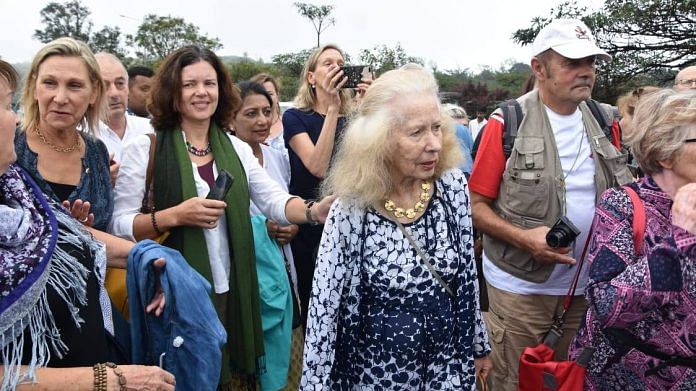Mumbai: Every year, Valivade, a village in Maharashtra’s Kolhapur district, gets a handful of visitors from Poland. Most of the times, the local villagers, the sarpanch and other gram panchayat officials show them around, giving them an exhaustive tour of the village transcending all language barriers.
For these Polish visitors, this village located about 8 kilometres from Kolhapur city, was once their home. About 5,000 Polish families lived here as refugees between 1943 and 1948 during and after the Second World War. The first group arrived in Valivade on 11 June 1943.
1940s :: Polish Girl Wanda Kuraś With Indian Girls In Valivade, Kolhapur #IndiaPoland
( Photo – https://t.co/lpBjCWx4hc ) pic.twitter.com/kwETHSXdkB
— indianhistorypics (@IndiaHistorypic) September 12, 2019
“Every year we see at least 10-15 Polish visitors who go back to what remains of their erstwhile refugee barracks. After all, this was their home for six years,” Anil Pandhare, sarpanch of the Valivade village told ThePrint. “They had all the facilities then — houses with basic furniture, a church, schools, a garden and so on.”
1940s :: Printing House In Valivade, Kolhapur.
Valivade In Kolhapur Was The Largest Settlement of Polish Citizens In India During World War II #IndiaPoland
( Photo – https://t.co/P0gCYCFPQM ) pic.twitter.com/23iFORFNkc
— indianhistorypics (@IndiaHistorypic) September 14, 2019
This year, the local residents of Valivade are preparing for an even bigger welcome for the Poles.
On Saturday, a Polish government delegation led by the country’s Deputy Foreign Minister Marcin Przydacz will lay the foundation stone for a memorial pillar at Valivade along with Maharashtra government officials.
Also read: 6 WWII Polish survivors to pay homage to a Maharaja who saved their lives
The memorial
Sanjay Shinde, Kolhapur’s resident deputy collector, said the memorial will come up exactly where the refugee barracks are located.
“As of now, we will release the required funds for the memorial,” he said. “At a later date, the Union government will take a call on whether the Indian government, the state government or the Polish government will take care of the cost and maintenance of the memorial.”
The plan is to set up a permanent museum at the site with photographs, paintings, and other items from the time when Valivade was home to the Poles.
Polish Survivors of World War II Reliving Their Childhood Memories at Ancient Mahalaxmi Temple , Kolhapur
Polish Survivors Lived In Kolhapur During World War II #IndiaPoland pic.twitter.com/iT7umXuAOs
— indianhistorypics (@IndiaHistorypic) September 14, 2019
Sarpanch Pandhare said originally there were nearly 600-700 barracks where the Polish refugees lived. “The government offered many of these barracks as residences to the Pakistani Sindhi population that crossed over to India during Partition,” he said. “Many built more modern houses and bungalows at the site of the barracks while some eventually left.
“There are about a hundred barracks still in existence but these are now in a very dilapidated, neglected state,” he added.
Shinde said besides the Polish government delegation, about 20 Poles who had lived in these refugee barracks as children have also arrived in Kolhapur and will attend Saturday’s event. They have been designated as state guests.
Lancucka Labus, one of the Poles visiting India for the event, told Doordarshan, “When we were deported from Poland to Russia, I was four. It was such a hell that it wiped out almost everything from my mind as if my mind was protecting itself from the horrors my family went through. It is in India that I have my first childhood memories. Happy memories that I can recall.”
The Poles and Indians
Besides the 20 Polish guests and the Polish government delegation, Valivade will have some more special visitors who signify the friendship and the intermingling between the Indian and Polish communities. These are three families from Kolhapur city — the Kashikars, Shindes and Jadhavs.
The Kashikars have familial ties to Poland. While her family members eventually returned to Poland, Wanda Nowicka chose to stay back and marry Vasant Kashikar. After marriage, Nowicka changed her name to Malti Kashikar and had five sons. She died in 2014.
Umesh Kashikar, 65, the fourth son, said, “We are still in touch with our Polish relatives. Often they come here or we visit Warsaw. We are all planning to go to the ceremony tomorrow. Valivade will always be special for us.”
The oldest of the Jadhavs and Shindes lived beside the Poles.
Dnyandeo Babanrao Jadhav, 88, and Bapusaheb Shakarrao Shinde, 87, fondly remember bonding with the Poles over sports as children. Both Jadhav and Shinde were members of the Kolhapur-based Padma Scouts, an open troop, which would often fraternise with the Polish members in Valivade.
“Padma Scouts was well known for hockey but the Poles would play football and volleyball, both games unknown to us then. They were also better built than us and used to play with proper kits and better shoes,” Jadhav recalled. “There was always a lot of friendly banter during our games.”
Shinde remembers how the Poles never had milk tea and always offered them black tea with lemon whenever they visited the Polish refugee camp. “They maintained such levels of cleanliness that one couldn’t see even a single twig out of place in the area around their barracks,” he said. “All their homes had beautiful front gardens. It felt peaceful.”
Both Jadhav and Shinde plan to attend Saturday’s function at Valivade with their families.
Also read: The Polish ambassador to India is fluent in Hindi & Urdu, loves biryani and Bollywood



